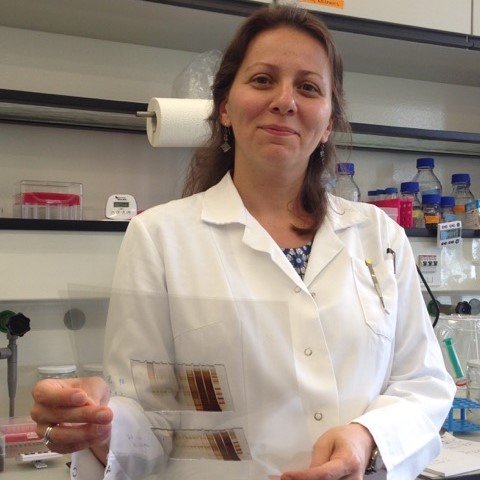
Magdalini Polymenidou, Prof. Dr. sc. nat.
- Seit 01.10.2019: Professorin für Molekulare Pathogenese der Neurodegeneration UZH
- 2013-2019: SNF-Professorin UZH
- Forschungsgebiet: Molekulare Pathogenese der Neurodegeneration
Navigation auf uzh.ch

| 1996 - 2001 | Studium der Pharmazie, Aristoteles Universität Thessaloniki, Griechenland |
| 2001 - 2005 |
Dissertation: Effizienz und Toxizität von Anti-Prion-Therapien und Antikörpern gegen das Prion-Protein als Werkzeug für die Diagnose von Prionenerkrankungen, Universität Zürich |
|
2006 - 2008 |
Postdoc: Erforschung von Prionenerkrankungen, Universität Zürich |
|
2008 - 2013 |
Postdoc: Erforschung der neurodegenerativen Erkrankung Amyotrophe Lateralsklerose (ALS), Universität von Kalifornien, San Diego |
|
Seit 2013 |
SNF-Assistenzprofessur, Universität Zürich |
|
Seit 2019 |
Ausserordentlichen Professorin für Biomedizin, insbesondere Molekulare Pathogenese der Neurodegeneration |
Was gefällt Ihnen an Ihrer Arbeit und was ist das Besondere dabei?
The thrill of a new discovery is by far the most exciting part of our work! And the hope that one day we may „stumble“ upon a discovery that may help patients suffering from these incurable, devastating diseases gives us the strongest motivation.
Hatten Sie (besondere weibliche) Vorbilder, die Ihren Werdegang beeinflusst haben? Welche?
I am happy to say that (unlike other scientific fields) the broader field of neurodegeneration has no dearth of brilliant women, who have made seminal contributions over the years. Virginia Lee, Huda Zoghbi, Laura Ranum, Susan Lindquist and Nancy Bonini are just a few that come to mind.
Welche Massnahmen ergreifen Sie als Professorin, um den wissenschaftlichen Nachwuchs (insbesondere Frauen) an Ihrem Institut zu fördern?
I try to motivate, support and guide all my team members (but also sometimes other students or postdocs that may seek advice), both men and women. What I am discovering is that everybody needs something different from their advisor/mentor and that the gender stereotypes are not always valid in this new generation of scientists – luckily! I am also working as the coordinator of the gender equality committee of the Zurich Neuroscience Center (ZNZ). Lastly, I try to be outspoken when it comes to the persisting gender imbalance in the Swiss academic community.
Welche Tipps geben Sie einer Jungforscherin mit auf den Weg, die eine akademische Karriere ins Auge fasst?
Don’t let anybody tell you that you have to choose between career and family! Stay focused on your career goals and work hard. The rest will take care of itself.
Ist es aus Ihrer Sicht eine Herausforderung die Balance zwischen der Forschung/der praktischen Arbeit in der Klink und der Familie/dem Privatleben zu halten? Wie gehen Sie damit um?
Sure it is, but it’s just life! The way I manage this is by sharing childcare with my husband. And by accepting that some days, there is no balance. But it is so worth it!